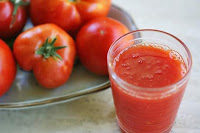News Quickie: Vitamin D Could Increase IGF-1 Delivery to the Muscle. Plus: Ergogenic Juicing For Ultra-Marathoners
 |
| Marathon de Sable ➯ Tomato juice |
 |
| Figure 1: Changes (% pre) in response to tomato juice & protein bar supplementation (Samaras. 2014) |
 |
| Increase in protein-anabolic p-AKT in vitamin D replete rats in the Ceglia study (Ceglia. 2013). |
And eventually you've read about similar benefits from sodium bicarbonate supplementation and an increase in pH at the SuppVersity before - not just in terms of skeletal muscle, but also in terms of growth hormone in general (Did you know: Your growth hormone release is blunted even with a mild reduction in your body's pH | read more)
 |
| Is the vitamin D you produce at the beach you're visiting only rarely the secret to perfect glucose control? Learn more in the "Beyond Carbohydrate Series" |
And the results of this study don't even seem completely nonsensical. As a SuppVersity reader you do after all know about the existing evidence of the negative effects low vitamin D levels will have on the function and strength of skeletal muscle ("low" in this context means less than 30ng 25-OHD on the lab report). Against that background, it does after all appear to be logical that refilling the levels would in one way or another help maintain or even build skeletal muscle.
The actual news here is yet not that vitamin D could potentially prevent muscle atrophy and increase hypertrophy. It's rather that these effects could be brought about by the significant increases in total IGF-1, as well as the IGF-1 binding proteins 1 + 3 researchers from the College of Rochester observed, when they added 4,000 IU of vitamin D to the diets of 6 vitamin D insufficient and deficient men (39.0±8.6yo with 25OH D 20.0±7.7ng/mL) who participated in a one-hour exercise program consisting of stretching (ST), aerobic (AB), and resistive (RT) exercises (Darr. 2014)
Did you know that there is more and even "active" Vitamin D in Foods! Eggs, fish and dairy contain an overlooked, yet physiologically relevant amount of ready-made 25OHD | learn more,
 |
| Suggested Read: "Underestimated Vitamin D Sources: Especially Eggs, But Also Chicken, Pork, Fish & Dairy Contain an Overlooked, Physiologically Relevant Amount of Ready-Made 25OHD" | more |
Whether the scientists' assumption that the increases in BP3 and BP1 levels and the maintenance of the total IGF-1 levels "potentially alter [...] the IGF system for enhanced muscle health" is accurate, let alone practically relevant is something this study cannot actually confirm.
And let's be honest, is it even likely? For someone without a pre-existing vitamin D deficiency? No. For someone with similarly low vitamin D levels as the deficient and insufficient subjects in a 2011 study by Stockton et al. (2011)? Probably, yes - but are you actually D-ficient?
 |
| Learn more about the previous "Tomatorade(R)" research. |
You've heard and read about the use of tomato juice as an anabolic intra-workout beverage in January 2013 (go back), you've learned about the anti-obesity and anti-cancer effects of (green) tomatoes in 2012 and you've read only yesterday in the SuppVersity Facebook News that green tomatoes protect your muscle from age-induced atrophy (read more).
And if you asked me. Adding another cup of tomato-juice will probably be the most promising "tweak" most of you can make to your nutrition / supplement regimen, because let's be honest. You do already take more than enough vitamin D to keep your levels stable and when it comes to protein, ... well, let's put it this way. I know that most of you err on the side of caution, irrespective of the fact that anything beyond 1.6-2.0g protein per kg body weight is probably going to do more harm than good (learn why).
- Ceglia, Lisa, et al. "Effects of alkali supplementation and vitamin D insufficiency on rat skeletal muscle." Endocrine 44.2 (2013): 454-464.
- Darr, Rachel, et al. "Vitamin D supplementation effects on the IGF system in men after acute exercise (828.15)." The FASEB Journal 28.1 Supplement (2014): 828-15.
- Samaras, Antonios, et al. "Effect of a special carbohydrate-protein bar and tomato juice supplementation on oxidative stress markers and vascular endothelial dynamics in ultra-marathon runners." Food and Chemical Toxicology (2014).
- Stockton, K. A., et al. "Effect of vitamin D supplementation on muscle strength: a systematic review and meta-analysis." Osteoporosis international 22.3 (2011): 859-871.










